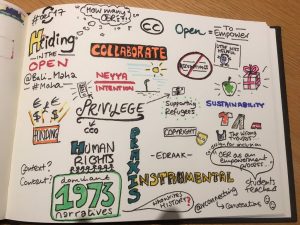News Story
OER17 – The Politics of Open
Friday 7 Apr 2017
The Open Educational Resources conference (OER17) took place on April 5th and 6th in London. In two days fully packed with paper presentations and interactive sessions, OER17 has presented an opportunity for open practitioners, activists, educators and policy makers to come together as a community to reflect on ‘The Politics of Open’ and discuss the following questions:
- What are our current key challenges and strengths – locally, nationally, and internationally?
- What are our priorities – in terms of political governance, organisational and personal politics?
- What are the changes that we want to effect together?
Alexander Mikroyannidis represented KMi and delivered a hands-on workshop together with Abi James (University of Southampton). The workshop was focused on the SlideWiki platform for collaborative authoring of open courseware. Similarly to the workshop delivered at the Open Education Global conference, this session offered the opportunity to participants to get acquainted with the redesigned SlideWiki platform and its functionalities for collaborative authoring of open courseware, crowdsourced translation of educational content, as well as social networking. Valuable discussions were conducted with participants and feedback was collected regarding the redesigned content editing interface of the platform, its capabilities for reusing various sources of external media, as well as the import and export capabilities of educational content offered by the platform.
Related Links:
Latest News
KMi at the Palace of Westminster: Exploring Blockchain for Society and Economy
OUAnalyse at the Digital Ethics Summit 2025: Advancing Responsible AI in Education

